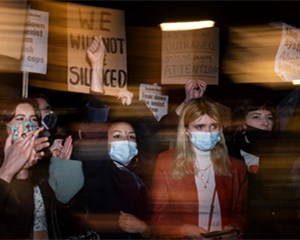But for those at the top of the social pecking order, narcissism mutates, not into loss, not into something you have at least partly to relinquish, but into an accursed gift, one that too easily leads to violence. No human, however powerful, is spared confrontation with the limits of their own power, with those realms, in the words of Hannah Arendt, "in which man cannot change and cannot act and in which, therefore, he has a distinct tendency to destroy".
但對于那些處于社會等級頂端的人來說,自戀會變異,不是變成失去,也不是變成你至少有一部分可以放棄的東西,而是變成一種受詛咒的禮物,一種太容易導致暴力的禮物。無論多么強大的人類,都無法避免與自身力量的局限發(fā)生沖突,用漢娜·阿倫特的話來說,“在這些領域中,人類無法改變,無法行動,因此,他有明顯的毀滅傾向”。
Arendt was writing in the 50s about the forms of murderous totalitarianism that had spread over the Earth, but her prescient words are no less relevant now, when dictatorships are on the rise, we face the destruction of the planet, black men are being shot on the streets of the US, and the rates of death from austerity, rampant inequality and impoverishment are increasing by the day. When the pandemic started to break across the globe at the end of 2019, it soon became clear that one of its most striking features would be the way it accentuates the racial and economic fault lines of the world – from the fact that black, Asian and minority ethnic citizens in the UK are four times more likely than white people to die of Covid-19, to the killing of George Floyd which, mid-pandemic, repeated and underscored a historic context of violence. Nor did it seem to occur to any of the (mainly) men in power that the mantra to stay home and save lives in fact threatened the lives of women subject to domestic violence who were now trapped inside their homes; under lockdown the rate of such violence has soared.
阿倫特在50年代寫的是遍布地球的各種形式的殘忍的極權主義,但她那有先見之明的話在現(xiàn)在也同樣適用,當獨裁統(tǒng)治抬頭時,我們面臨著地球的毀滅,黑人在美國街頭被槍殺,財政緊縮、嚴重的不平等和貧困造成的死亡率與日俱增。2019年底,疫情開始在全球蔓延,人們很快意識到,它最顯著的特征之一就是它突出了世界上的種族和經(jīng)濟斷層線——從英國的黑人、亞洲人和少數(shù)族裔公民死于新冠的可能性是白人的四倍,到新冠期間喬治·弗洛伊德的死,這些事實重復和強調(diào)了暴力的歷史背景。那些掌權的(主要是)男性似乎也都沒有想到,待在家里拯救生命的咒語實際上威脅到了那些現(xiàn)在被困在家里遭受家庭暴力的女性的生命,在封鎖狀態(tài)下,此類暴力事件激增。

Who decides what is called out as violence? Who determines the forms of violence we are allowed, and permit ourselves, to see? Not naming violence – its often undercover path of destruction, its random disposal of the bodies it needs and does not need – is one of the ways that capitalism has always preserved and perpetuated itself.
所謂的“暴力”是誰來決定的?我們被允許并且允許自己看到的暴力形式又是誰來決定的?不點名暴力——暴力往往是隱蔽的毀滅之路,它隨意地處置自己需要和不需要的尸體——是資本主義一直保存和延續(xù)自己的方式之一。
In one of her sharpest insights and most trenchant ripostes, socialist revolutionary Rosa Luxemburg cautioned against the charge that the 1905 Russian Revolution had spilt blood by pointing out that the level of suffering was nothing compared with the indiscriminate, mostly unremarked, cutting down of lives by the brute machinery of capital that had flourished up to then. "Abroad the picture created of the Russian Revolution is that of an enormous blood-bath, with all the unspeakable suffering of the people without a single ray of light," she stated at a rally in Mannheim in 1906. "The suffering during the revolution is a mere nothing compared to what the Russian people had to put up with before the revolution under so-called quiet conditions."
社會主義革命家羅莎·盧森堡在她最敏銳的洞察力和最尖銳的反駁中,告誡人們不要指責1905年的俄國革命造成了流血,她指出,與當時繁榮的資本機器不分青紅皂白地濫殺無辜相比,這種痛苦的程度簡直微不足道。1906年,她在曼海姆的一次集會上說:“在國外,俄國革命被描繪成一場巨大的大屠殺,人們在沒有一絲光亮的情況下承受著難以言喻的痛苦。”“與俄羅斯人民在革命前所謂的平靜條件下所忍受的苦難相比,革命期間的苦難簡直不值一提。”











